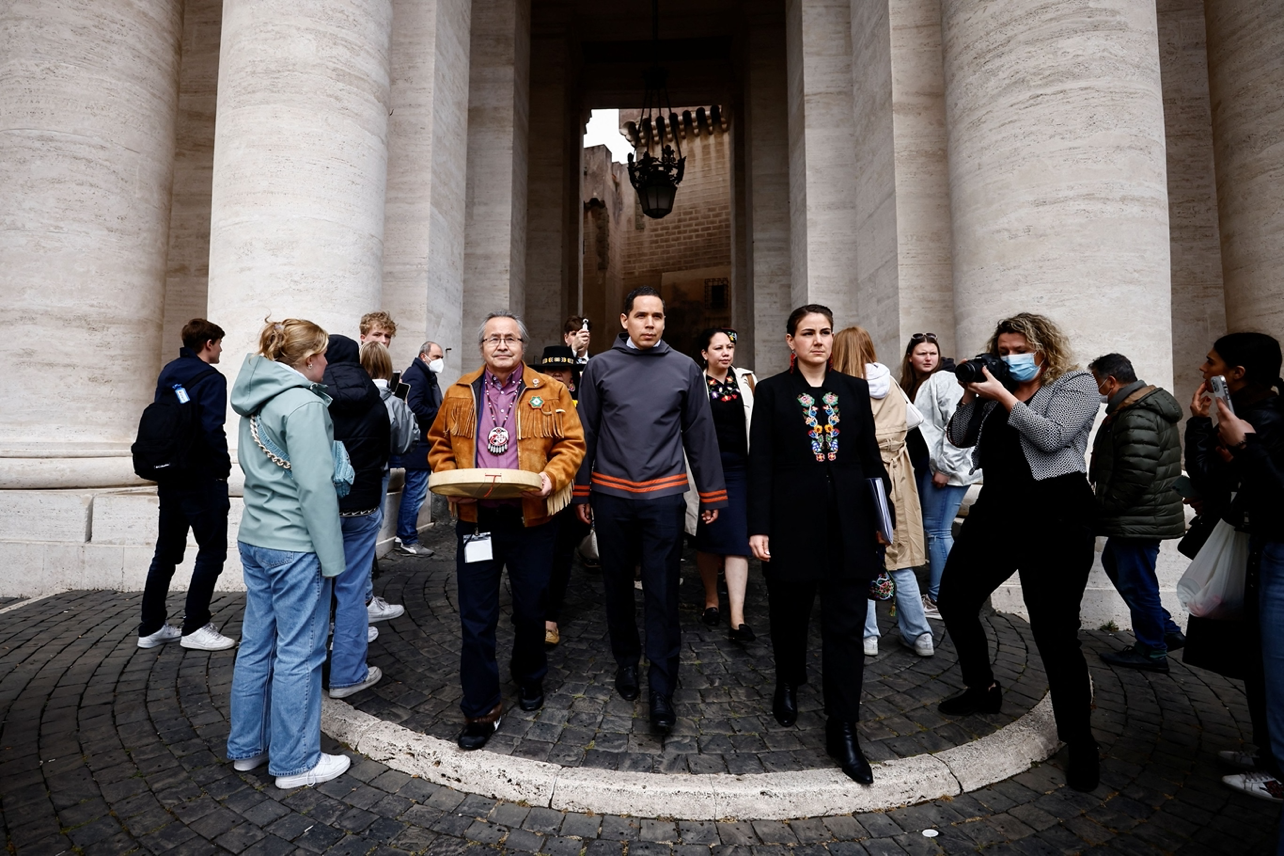Pope Francis has apologized for the abuses a number of Catholics perpetrated against Indigenous children in Canadian residential schools, a bittersweet moment for many survivors who have waited decades to hear a papal apology for their suffering.
Close to 200 people, including residential-school survivors and their families, were in the Apostolic Palace hall at the Vatican on Friday to hear the Pope speak. The gathering was also livestreamed.
“For the deplorable conduct of those members of the Catholic Church, I ask for God’s forgiveness and I want to say to you with all my heart: I am very sorry,” Pope Francis said.
This is the first time that a pope has issued a formal public apology to Indigenous people in Canada over the harms inflicted at residential schools. Francis’s predecessor, Pope Benedict XVI, expressed sorrow, in a private meeting with the Assembly of First Nations in 2009, a statement that fell short of the full, public apology many survivors still want to see issued in Canada.
The Truth and Reconciliation Commission, which examined the breadth of residential-school abuses in Canada, had called for a papal apology in 2015, part of 94 calls to action. But there were few signs one would come until the discovery of unmarked graves at a former residential school in Kamloops last May ignited public outcry and renewed scrutiny of the Catholic Church’s role in the government-funded schools.
In their meetings this week with Pope Francis, Métis, Inuit and First Nations delegations, including elders, youth, knowledge keepers and leaders told him about the devastating legacy of the schools, in which thousands of children were abused, ripped from their families and stripped of their culture and language. Many of the delegates shed tears on Friday as he responded to their stories with heartfelt remarks.
“I also feel shame,” he said, “I feel shame – sorrow and shame – for the role that a number of Catholics, particularly those with educational responsibilities, have had and all these things that wounded you, in the abuses you suffered, and in the lack of respect shown for your identity, your culture and even your spiritual values.”
Speaking from St. Peter’s Square after the meeting with Francis, as the powerful sounds of First Nations drumming and singing reverberated behind her, Cassidy Caron, president of the Métis National Council, called the Pope’s words “historic – to be sure, they were necessary.”
She said she looks forward to a papal apology in Canada made to survivors and their families, and that there are more tangible steps that the church must take to repair the wounds. “Reconciliation did not start today with the Pope’s words of apology,” she said. “And it certainly doesn’t end here, either.”
Full text of Pope Francis’s apology for residential schools
Through gifts and customs, Indigenous delegates to Vatican share their history and hopes
Opinion: In Rome, I have seen Indigenous people bring hope and resistance to the Pope’s doorstep
Calling it an emotional and difficult week of bringing the truth about the harms of the residential-school experience to the Vatican, Natan Obed, lead Inuit delegate and president of Inuit Tapiriit Kanatami, welcomed the Pope’s words.
“Pope Francis reflected upon the entirety of our message that we have brought forward,” he said. “And he did so in a way that really showed his empathy toward the Indigenous peoples of Canada. He also showed a willingness to do something that the Catholic Church has not done yet, which is to frankly and openly offer an apology.”
Gerald Antoine, lead First Nations delegate, NWT regional chief for the Assembly of First Nations and residential-school survivor, said, “We accept this apology as a gesture of good faith that acknowledges that he will come to our home, Turtle Island, and to formally apologize to all our family.”
It’s a historical first step, he said, “however, only a first step: more needs to be done.”
Not everyone was happy with the wording of Francis’s statement. Some noted that the Pope apologized for the conduct of members of the Catholic Church – rather than the systemic issues within the church itself.
Friday’s apology doesn’t preclude another apology in Canada; the Pope has promised to come to Canada later this year. He hinted he may time his visit for the feast of St. Anne on July 26.
More than 150,000 Inuit, Métis and First Nations children were forced to attend residential schools, in a government-backed system designed to strip them of their language, culture and identity. More than 4,000 children died, according to the TRC, in what it has said amounts to cultural genocide.
In their meetings with the Pope, the Indigenous delegations also asked for reparations for the harms done, land to be returned, historical records shared and more supports given in the search for unmarked graves at the sites of former residential schools.
The location of Friday’s gathering – in the Sala Clementina in the Vatican’s Apostolic Palace – spoke to the significance of the event. The sala, an enormous hall decorated with religious frescos, was built in the 16th century and is used by popes for meetings of absolute holy and administrative importance.
Almost 200 delegates and other participants, including musicians and dancers, opened the session with an expression of gratitude to the Pope for listening to the Indigenous stories of suffering and intergenerational trauma resulting from the Catholic-run schools.
Francis wore his trademark simple white cassock while sitting on a white thronelike chair during the event. Also there were seven bishops from Canada.
There was a prayer by elder Fred Kelly, spiritual adviser to the Assembly of First Nations, in both English and the Anishinaabe language, along with prayers from the other Indigenous groups who spoke in Dene and Inuktitut.
After Francis spoke, the celebratory cultural events began, including an Inuit drum dance, a performance by Métis fiddlers and First Nations’ dancers. The event finished with gift giving by both sides, and a blessing from Francis.
Among the gifts presented to the Pope on Friday was a pair of traditional handmade snowshoes, brought by Adrian Gunner, Cree Nation Youth Grand Chief of northern Quebec. He walks in his grandfather’s footsteps: four decades ago, Cree Chief Billy Diamond presented a pair of snowshoes to Pope John Paul II, as he urged the pontiff to support Indigenous rights.
After the apology, Francis presented golden olive branches, a symbol of peace and reconciliation, to representatives of the three Indigenous groups, and thanked them for their visit.
Former national chief of the Assembly of First Nations Phil Fontaine accepted the gift, appearing happy to finally hear an apology.
Mr. Fontaine was one of the first survivors to speak publicly about the abuses endured by him and others at residential schools. He later negotiated the Indian Residential Schools Settlement Agreement, but failed to get an apology in a 2009 visit with Pope Benedict.
“This is the culmination of years of work, if I can describe it as work,” he said.
“This moment, I think, reflects the determination and the courage of many that kept up the fight over the years and it’s really about never losing hope.”
While details of Pope Francis’s visit to Canada haven’t been confirmed, Indigenous leaders in Rome said it has to be planned with their input and consultation.
Francis’s apology capped a historic week, one in which a display of Indigenous artifacts in the Vatican’s ethnological museum spurred calls for repatriation, and the high-profile case of a retired Oblate priest, accused of abusing Inuit children, saw the renewal of a Canada-wide warrant for his arrest.
The week ended in unity – with leaders of three Indigenous groups standing together. “I want to end today by saying that Métis, First Nations and Inuit have modelled unity in this Vatican visit,” said Ms. Caron. “We are showing the world what can happen when we are united. And I am proud to stand here with my brothers today.”
Our Morning Update and Evening Update newsletters are written by Globe editors, giving you a concise summary of the day’s most important headlines. Sign up today.




